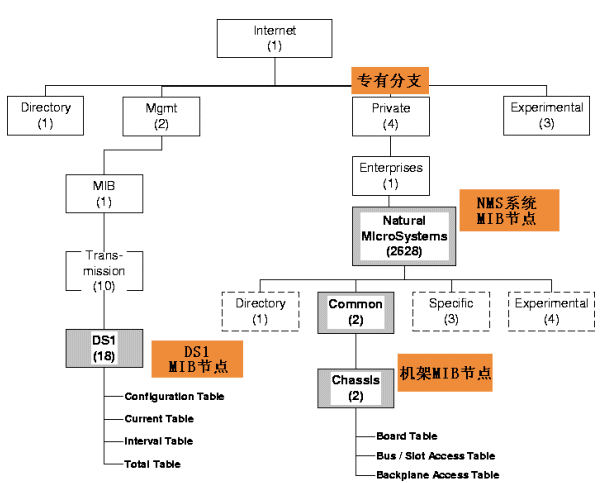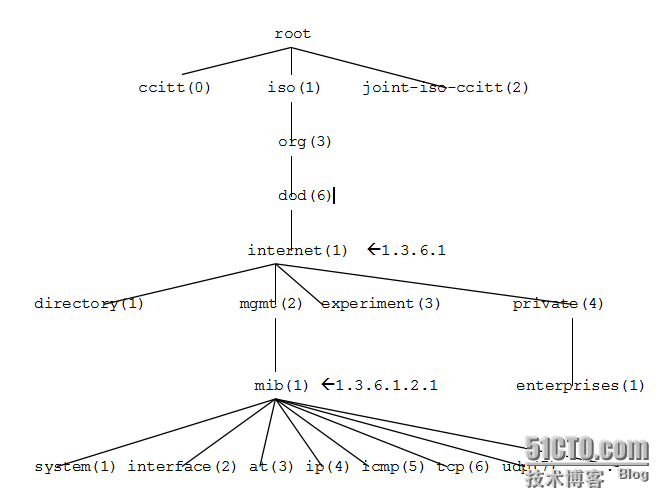SNMP:“简单网络管理协议”,用于网络管理的协议。SNMP用于网络设备的管理。SNMP的工作方式:管理员需要向设备获取数据,所以SNMP提供了“读”操作;管理员需要向设备执行设置操作,所以SNMP提供了“写”操作;设备需要在重要状况改变的时候,向管理员通报事件的发生,所以SNMP提供了“Trap”操作。
什么是 MIB?
MIB 是描述被管理设备上的参数的数据结构。如前所述,管理一个设备,就是利用 SNMP 协议,通过网络对被管理设备上的参数进行 get 和 set 操作。
SNMP MIB 是定义了这个设备都有哪些信息可以被收集,哪些trap的触发条件可以被定义,只有符合TRAP触发条件的事件才被发送出去
snmpget 命令
[root@vStack ~]# snmpget -v 2c -c public localhost system.sysDescr.0 SNMPv2-MIB::sysDescr.0 = STRING: Linux vStack 3.10.0-327.el7.x86_64 #1 SMP Thu Nov 19 22:10:57 UTC 2015 x86_64
snmpbulkwalk 命令
[root@vStack ~]# snmpbulkwalk -v 2c -c public 127.0.0.1 .1.3.6.1.2.1.1 SNMPv2-MIB::sysDescr.0 = STRING: Linux vStack 3.10.0-327.el7.x86_64 #1 SMP Thu Nov 19 22:10:57 UTC 2015 x86_64 SNMPv2-MIB::sysObjectID.0 = OID: NET-SNMP-MIB::netSnmpAgentOIDs.10 DISMAN-EVENT-MIB::sysUpTimeInstance = Timeticks: (290108) 0:48:21.08 SNMPv2-MIB::sysContact.0 = STRING: Root <root@localhost> (configure /etc/snmp/snmp.local.conf) SNMPv2-MIB::sysName.0 = STRING: vStack SNMPv2-MIB::sysLocation.0 = STRING: Unknown (edit /etc/snmp/snmpd.conf) SNMPv2-MIB::sysORLastChange.0 = Timeticks: (4) 0:00:00.04 SNMPv2-MIB::sysORID.1 = OID: SNMP-MPD-MIB::snmpMPDCompliance SNMPv2-MIB::sysORID.2 = OID: SNMP-USER-BASED-SM-MIB::usmMIBCompliance SNMPv2-MIB::sysORID.3 = OID: SNMP-FRAMEWORK-MIB::snmpFrameworkMIBCompliance SNMPv2-MIB::sysORID.4 = OID: SNMPv2-MIB::snmpMIB SNMPv2-MIB::sysORID.5 = OID: TCP-MIB::tcpMIB SNMPv2-MIB::sysORID.6 = OID: IP-MIB::ip SNMPv2-MIB::sysORID.7 = OID: UDP-MIB::udpMIB SNMPv2-MIB::sysORID.8 = OID: SNMP-VIEW-BASED-ACM-MIB::vacmBasicGroup SNMPv2-MIB::sysORID.9 = OID: SNMP-NOTIFICATION-MIB::snmpNotifyFullCompliance SNMPv2-MIB::sysORID.10 = OID: NOTIFICATION-LOG-MIB::notificationLogMIB SNMPv2-MIB::sysORDescr.1 = STRING: The MIB for Message Processing and Dispatching. SNMPv2-MIB::sysORDescr.2 = STRING: The management information definitions for the SNMP User-based Security Model. SNMPv2-MIB::sysORDescr.3 = STRING: The SNMP Management Architecture MIB. SNMPv2-MIB::sysORDescr.4 = STRING: The MIB module for SNMPv2 entities SNMPv2-MIB::sysORDescr.5 = STRING: The MIB module for managing TCP implementations SNMPv2-MIB::sysORDescr.6 = STRING: The MIB module for managing IP and ICMP implementations SNMPv2-MIB::sysORDescr.7 = STRING: The MIB module for managing UDP implementations SNMPv2-MIB::sysORDescr.8 = STRING: View-based Access Control Model for SNMP. SNMPv2-MIB::sysORDescr.9 = STRING: The MIB modules for managing SNMP Notification, plus filtering. SNMPv2-MIB::sysORDescr.10 = STRING: The MIB module for logging SNMP Notifications. SNMPv2-MIB::sysORUpTime.1 = Timeticks: (3) 0:00:00.03 SNMPv2-MIB::sysORUpTime.2 = Timeticks: (3) 0:00:00.03 SNMPv2-MIB::sysORUpTime.3 = Timeticks: (3) 0:00:00.03 SNMPv2-MIB::sysORUpTime.4 = Timeticks: (3) 0:00:00.03 SNMPv2-MIB::sysORUpTime.5 = Timeticks: (3) 0:00:00.03 SNMPv2-MIB::sysORUpTime.6 = Timeticks: (3) 0:00:00.03 SNMPv2-MIB::sysORUpTime.7 = Timeticks: (3) 0:00:00.03 SNMPv2-MIB::sysORUpTime.8 = Timeticks: (3) 0:00:00.03 SNMPv2-MIB::sysORUpTime.9 = Timeticks: (4) 0:00:00.04 SNMPv2-MIB::sysORUpTime.10 = Timeticks: (4) 0:00:00.04
snmpbulkwalk命令: 获取snmp服务器的mib-2各种资讯,snmpbulkwalk用于通过SNMPv2 的SNMP GET BULK请求命令与其它网络实体通信,只能用于snmpv2,速度快于snmpwalk
snmptrap 命令
[root@vStack snmp]# snmptrap No hostname specified. USAGE: snmptrap [OPTIONS] AGENT TRAP-PARAMETERS Version: 5.7.2 Web: http://www.net-snmp.org/ Email: net-snmp-coders@lists.sourceforge.net OPTIONS: -h, --help display this help message -H display configuration file directives understood -v 1|2c|3 specifies SNMP version to use -V, --version display package version number SNMP Version 1 or 2c specific -c COMMUNITY set the community string SNMP Version 3 specific -a PROTOCOL set authentication protocol (MD5|SHA) -A PASSPHRASE set authentication protocol pass phrase -e ENGINE-ID set security engine ID (e.g. 800000020109840301) -E ENGINE-ID set context engine ID (e.g. 800000020109840301) -l LEVEL set security level (noAuthNoPriv|authNoPriv|authPriv) -n CONTEXT set context name (e.g. bridge1) -u USER-NAME set security name (e.g. bert) -x PROTOCOL set privacy protocol (DES|AES) -X PASSPHRASE set privacy protocol pass phrase -Z BOOTS,TIME set destination engine boots/time General communication options -r RETRIES set the number of retries -t TIMEOUT set the request timeout (in seconds) Debugging -d dump input/output packets in hexadecimal -D[TOKEN[,...]] turn on debugging output for the specified TOKENs (ALL gives extremely verbose debugging output) General options -m MIB[:...] load given list of MIBs (ALL loads everything) -M DIR[:...] look in given list of directories for MIBs (default: /root/.snmp/mibs:/usr/share/snmp/mibs) -P MIBOPTS Toggle various defaults controlling MIB parsing: u: allow the use of underlines in MIB symbols c: disallow the use of "--" to terminate comments d: save the DESCRIPTIONs of the MIB objects e: disable errors when MIB symbols conflict w: enable warnings when MIB symbols conflict W: enable detailed warnings when MIB symbols conflict R: replace MIB symbols from latest module -O OUTOPTS Toggle various defaults controlling output display: 0: print leading 0 for single-digit hex characters a: print all strings in ascii format b: do not break OID indexes down e: print enums numerically E: escape quotes in string indices f: print full OIDs on output n: print OIDs numerically q: quick print for easier parsing Q: quick print with equal-signs s: print only last symbolic element of OID S: print MIB module-id plus last element t: print timeticks unparsed as numeric integers T: print human-readable text along with hex strings u: print OIDs using UCD-style prefix suppression U: don't print units v: print values only (not OID = value) x: print all strings in hex format X: extended index format -I INOPTS Toggle various defaults controlling input parsing: b: do best/regex matching to find a MIB node h: don't apply DISPLAY-HINTs r: do not check values for range/type legality R: do random access to OID labels u: top-level OIDs must have '.' prefix (UCD-style) s SUFFIX: Append all textual OIDs with SUFFIX before parsing S PREFIX: Prepend all textual OIDs with PREFIX before parsing -L LOGOPTS Toggle various defaults controlling logging: e: log to standard error o: log to standard output n: don't log at all f file: log to the specified file s facility: log to syslog (via the specified facility) (variants) [EON] pri: log to standard error, output or /dev/null for level 'pri' and above [EON] p1-p2: log to standard error, output or /dev/null for levels 'p1' to 'p2' [FS] pri token: log to file/syslog for level 'pri' and above [FS] p1-p2 token: log to file/syslog for levels 'p1' to 'p2' -C APPOPTS Set various application specific behaviour: i: send an INFORM instead of a TRAP -v 1 TRAP-PARAMETERS: enterprise-oid agent trap-type specific-type uptime [OID TYPE VALUE]... or -v 2 TRAP-PARAMETERS: uptime trapoid [OID TYPE VALUE] ... [root@vStack snmp]#
snmptrap的命令行格式如下:
snmptrap -v [2c|3] [COMMON OPTIONS] uptime trap-oid [OID TYPE VALUE] $ snmptrap -v 2c -c public 127.0.0.1:162 "" .1.3.6.1.4.1.2021.251.1 sysLocation.0 s "test" $ snmptrap -v 2c -c public 127.0.0.1:162 "12345678" .1.3.6.1.4.1.2021.251.1 sysLocation.0 s "test"
snmptrap -v [2c|3] [COMMON OPTIONS] uptime trap-oid [OID TYPE VALUE] $ snmptrap -v 2c -c public 127.0.0.1:162 "" .1.3.6.1.4.1.2021.251.1 sysLocation.0 s "test" $ snmptrap -v 2c -c public 127.0.0.1:162 "12345678" .1.3.6.1.4.1.2021.251.1 sysLocation.0 s "test"
SNMP的MIB详解
1.MIB管理信息库
IETF规定的管理信息库MIB(由中定义了可访问的网络设备及其属性,由对象识别符(OID:Object Identifier)唯一指定。MIB是一个树形结构,SNMP协议消息通过遍历MIB树形目录中的节点来访问网络中的设备。
下图给出了NMS系统中SNMP可访问网络设备的对象识别树(OID:Object Identifier)结构。

上图中的节点是从internet开始的,其实上面还有几个节点请看下图。

pysnmp:
>>> from pysnmp.entity.rfc3413.oneliner import cmdgen
>>> errorIndication, errorStatus, errorIndex, varBinds = cmdgen.CommandGenerator().getCmd( cmdgen.CommunityData('my-agent', 'public', 0), cmdgen.UdpTransportTarget(('localhost', 161)), (1,3,6,1,2,1,1,1,0) )
>>> varBinds
[(ObjectName('1.3.6.1.2.1.1.1.0'), OctetString('Linux devstack 3.10.0-514.26.2.el7.x86_64 #1 SMP Tue Jul 4 15:04:05 UTC 2017 x86_64'))]
>>>
snmptranslate 命令
将 MIB OIDs 的两种表现形式 ( 数字及文字 ) 相互转换。并显示 MIB 的内容与结构,如下所示:
[root@devstack ~]# snmptranslate -On SNMPv2-MIB::sysUpTime.0
.1.3.6.1.2.1.1.3.0
[root@devstack ~]# snmptranslate .1.3.6.1.2.1.1.3.0
DISMAN-EVENT-MIB::sysUpTimeInstance
[root@devstack ~]#
snmptranslate -Tp iso.org.dod.internet.mgmt.mib-2 #用snmptranslate打印从指定OID(.1.3.6.1.2.1)开始一直到该OID(.1.3.6.1.2.1)所属的 MIB 子树末端的树型结构信息 snmptranslate -Ta #用snmptranslate导出所有已经加载的 MIB 的数据,每个对象一行 snmptranslate -Tl #用snmptranslate导出所有已经加载的 MIB 的对象,并且输出完整的 oid 路径 snmptranslate -To #用snmptranslate导出已经加载的所有 MIB 的数字格式的 oid ,不含值和类型,仅仅有 oid 而已 snmptranslate -Ts #用snmptranslate只输出文字格式的 OID 名称而已
2, 处理自定义trap
编写两个mib文件,包括snmp1和snmp2两种trap
Snmp1的mib:TRAP-TEST-MIB.txt:
TRAP-TEST-MIB DEFINITIONS ::= BEGIN
IMPORTS ucdExperimental FROM UCD-SNMP-MIB;
demotraps OBJECT IDENTIFIER ::= { ucdExperimental 990 }
demo-trap TRAP-TYPE
STATUS current
ENTERPRISE demotraps
VARIABLES { sysLocation }
DESCRIPTION "This is just a demo"
::= 17
END
Snmp2的mib:NOTIFICATION-TEST-MIB.txt:
NOTIFICATION-TEST-MIB DEFINITIONS ::= BEGIN
IMPORTS ucdavis FROM UCD-SNMP-MIB;
demonotifs OBJECT IDENTIFIER ::= { ucdavis 991 }
demo-notif NOTIFICATION-TYPE
STATUS current
OBJECTS { sysLocation }
DESCRIPTION "Just a test notification"
::= { demonotifs 17 }
END
然后放入到mibs文件夹中
在manager端敲入命令:
snmptrap -v 2c -c public 127.0.0.1:162 "" NOTIFICATION-TEST-MIB::demo-notif SNMPv2-MIB::sysLocation.0 s "just here"
agent端输出:
Received 96 bytes from UDP: [127.0.0.1]:44858 0000: 30 5E 02 01 01 04 06 70 75 62 6C 69 63 A7 51 02 0^.....public.Q. 0016: 04 7D BA 0E AA 02 01 00 02 01 00 30 43 30 10 06 .}.........0C0.. 0032: 08 2B 06 01 02 01 01 03 00 43 04 00 89 19 29 30 .+.......C....)0 0048: 18 06 0A 2B 06 01 06 03 01 01 04 01 00 06 0A 2B ...+...........+ 0064: 06 01 04 01 8F 65 87 5F 11 30 15 06 08 2B 06 01 .....e._.0...+.. 0080: 02 01 01 06 00 04 09 6A 75 73 74 20 68 65 72 65 .......just here 2008-11-11 10:22:27 localhost [UDP: [127.0.0.1]:44858]: DISMAN-EVENT-MIB::sysUpTimeInstance = Timeticks: (8984873) 1 day, 0:57:28.73 SNMPv2-MIB::snmpTrapOID.0 = OID: NOTIFICATION-TEST-MIB::demo-notif SNMPv2-MIB::sysLocation.0 = STRING: just here sh: log_it: command not found
其中just here就是我们想要的结果.
3, 自己编写处理trap脚本
建立root/bin/traps文件,输入以下内容:
#!/bin/sh read host read ip vars= while read oid val do if [ "$vars" = "" ] then vars="$oid = $val" else vars="$vars, $oid = $val" fi done echo trap: $1 $host $ip $vars
在manager的snmptrapd.conf加入以下几行:
traphandle SNMPv2-MIB::coldStart /root/bin/traps cold traphandle SNMPv2-MIB::warmStart /root/bin/traps warm traphandle IF-MIB::linkDown /root/bin/traps down traphandle IF-MIB::linkUp /root/bin/traps up traphandle SNMPv2-MIB::authenticationFailure /root/bin/traps auth # this one is deprecated traphandle .1.3.6.1.6.3.1.1.5.6 /root/bin/traps egp-neighbor-loss
在 manage 端 发送 trap
snmptrap -v 1 -c public 127.0.0.1:162 TRAP-TEST-MIB::demotraps 127.0.0.1 2 0 "" IF-MIB::ifIndex i 1
snmptrap -v 2c -c public 127.0.0.1:162 "" NOTIFICATION-TEST-MIB::demo-notif SNMPv2-MIB::sysLocation.0 s "just here"
TRAP-TEST-MIB::demotraps 自定义mib 文件中的
agent端输出:
Received 96 bytes from UDP: [127.0.0.1]:44858 0000: 30 5E 02 01 01 04 06 70 75 62 6C 69 63 A7 51 02 0^.....public.Q. 0016: 04 7D BA 0E AA 02 01 00 02 01 00 30 43 30 10 06 .}.........0C0.. 0032: 08 2B 06 01 02 01 01 03 00 43 04 00 89 19 29 30 .+.......C....)0 0048: 18 06 0A 2B 06 01 06 03 01 01 04 01 00 06 0A 2B ...+...........+ 0064: 06 01 04 01 8F 65 87 5F 11 30 15 06 08 2B 06 01 .....e._.0...+.. 0080: 02 01 01 06 00 04 09 6A 75 73 74 20 68 65 72 65 .......just here 2008-11-11 10:22:27 localhost [UDP: [127.0.0.1]:44858]: DISMAN-EVENT-MIB::sysUpTimeInstance = Timeticks: (8984873) 1 day, 0:57:28.73 SNMPv2-MIB::snmpTrapOID.0 = OID: NOTIFICATION-TEST-MIB::demo-notif SNMPv2-MIB::sysLocation.0 = STRING: just here sh: log_it: command not found
其中just here就是我们想要的结果.
4, 让agent自动产生trap
配置agent的snmpd.conf,加入以下几行:(参考:
http://www.net-snmp.org/wiki/index.php/FAQ:Agent_17):
# From: http://www.net-snmp.org/wiki/index.php/FAQ:Agent_17 # send v1 traps trapsink 127.0.0.1:162 # also send v2 traps trap2sink 127.0.0.1:162 informsink 127.0.0.1:162
手动启动前台显示 snmptrapd 进行,显示消息
[root@vStack ~]# snmptrapd -d -f -Lo NET-SNMP version 5.7.2 Received 72 byte packet from UDP: [127.0.0.1]:51751->[127.0.0.1]:162 0000: 30 46 02 01 01 04 06 70 75 62 6C 69 63 A7 39 02 0F.....public.9. 0016: 04 60 A5 1A 1E 02 01 00 02 01 00 30 2B 30 0F 06 .`.........0+0.. 0032: 08 2B 06 01 02 01 01 03 00 43 03 06 1E B7 30 18 .+.......C....0. 0048: 06 0A 2B 06 01 06 03 01 01 04 01 00 06 0A 2B 06 ..+...........+. 0064: 01 04 01 8F 65 81 7B 01 ....e.{. 2017-08-28 10:27:59 localhost [UDP: [127.0.0.1]:51751->[127.0.0.1]:162]: DISMAN-EVENT-MIB::sysUpTimeInstance = Timeticks: (401079) 1:06:50.79 SNMPv2-MIB::snmpTrapOID.0 = OID: UCD-SNMP-MIB::ucdStart sh: page_me: 未找到命令
通过命令查看出 mib 文件保存的位置:
[root@vStack snmp]# snmptrap -v 2c -c public 127.0.0.1:162 "" NOTIFICATION-TEST-MIB::demo-notif SNMPv2-MIB::sysLocation.0 s "just here" MIB search path: /root/.snmp/mibs:/usr/share/snmp/mibs Cannot find module (NOTIFICATION-TEST-MIB): At line 0 in (none) NOTIFICATION-TEST-MIB::demo-notif: Unknown Object Identifier
链接: http://freeloda.blog.51cto.com/2033581/1306743/
用SNMP实现对大型网络的轻松管理 http://guojiping.blog.51cto.com/5635432/985885
